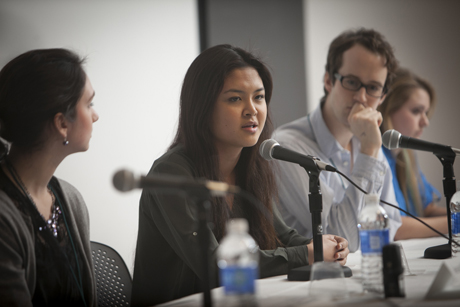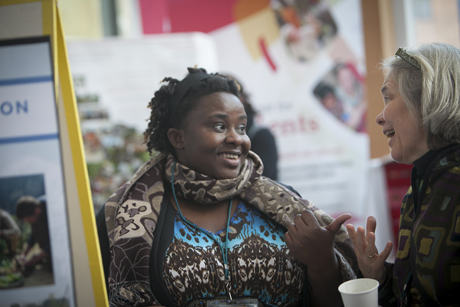Global experiences add 'richness to the conversation'
By Joe Wilensky


Cornell faculty and students discussed the transformative potential of educational and research experiences abroad and global-oriented learning goals during a daylong symposium, “What Constitutes a Meaningful International Experience?” Feb. 10 on campus.
About 140 people attended the event and were welcomed by Fredrik Logevall, vice provost for international affairs and director of the Mario Einaudi Center for International Studies.
Cornell President David Skorton has challenged the university to regain its global edge, internationalize its curriculum and increase to 50 percent (from 27 percent) the number of students who have significant international experiences. The symposium was part of Logevall’s ongoing international initiative for Cornell and the continuation of a conversation about how to define “meaningful” or “significant” international student experiences.
Michael Vande Berg, former vice president for academic affairs at the Council on International Educational Exchange, moderated several discussions. He said international student experiences are most effective when they “enhance their abilities to cross cultural boundaries.”
He discussed how college students’ abroad experiences have moved from an “immersion” model to ones that advocate experiential, hands-on learning, mentoring before and during the experience, and reflection afterward.
Irby Lovette, associate professor of ecology and evolutionary biology, spoke about how the trip he runs for students to the Galapagos Islands began as a field class in the scientific tradition. But he didn’t start out thinking of the program’s potential to teach cultural competence and offer multidimensional learning opportunities. The course has recently been built into a semesterlong experience that includes a writing seminar that challenges students to explore human perspectives on the islands and the people who live and travel there.
“Students think they’re signing up for a biology class, but we’re also doing things on the humanities and cultural sides,” Lovette said.
María Antonia Garcés, professor of Hispanic studies, spoke about the 25-year-old Cornell study abroad program in Seville, Spain, that includes an orientation course in Ithaca and a three-week cultural seminar in Seville before courses begin. Students live with host families, and the staff in Seville is “extraordinary,” she said – ideal components to a strong immersion program.
Peter Hobbs, associate professor of crop and soil sciences, spoke about the international agriculture program that he runs in the College of Agriculture and Life Sciences; during hands-on, two-week experiences students interact with farmers in the host countries to learn about problems firsthand.
A student panel of Cornellians who had participated in international experiences discussed the role of cultural mentors and how their time abroad changed them. They said they dealt with their own biases and the cognitive dissonance that can come from suddenly adapting to another culture. Some kept journals abroad, encouraged by their cultural mentors and faculty members to reflect on their experiences and expectations.
Simon Boehme ’14 said the most valuable thing he learned in the ILR School’s global service learning program in India was patience, how to listen better and lead from behind.
Meghan Hilbert ’13 talked about her spring break trip with Engineers for a Sustainable World to build solar ovens in Nicaragua with a women’s collective. The students lived with the women’s families for a week, communicating only in Spanish while designing and constructing solar ovens with them (as well as doing household tasks like carrying water and baking tortillas). “Building cultural sensitivities happened from working alongside them,” Hilbert said.
Lodoe Sangmo ’14 described taking a course in Tanzania while remembering she was there primarily to learn and observe. When told to change from pants into a dress by a school security guard one morning, the pre-departure seminar she had taken helped her view gender there through a different cultural context.
This experience and others “honed my skills for communication with people from different cultures … and beliefs,” Sangmo said, “and how to form effective partnerships despite these differences.”
The students’ international experiences have led to new career goals; several who spoke want to pursue research and work internationally or in an international context. For example, Boehme said his experiences abroad were “applicable to all my classes … it added a richness to the conversation.”
The symposium drew from 31 case study reports of selected meaningful international experiences and programs across campus for the panelists and additional posters and materials on display. It was organized by the Einaudi Center in collaboration with Cornell Abroad, the Center for Engaged Learning + Research and the Office of Academic Diversity Initiatives and supported by several university councils and offices.
Media Contact
Get Cornell news delivered right to your inbox.
Subscribe